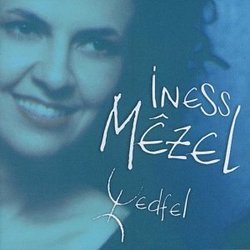| All Artists: Iness Mezel Title: Wedfel Members Wishing: 0 Total Copies: 0 Label: Silex Release Date: 7/13/1999 Album Type: Import Genres: International Music, Pop Style: Africa Number of Discs: 1 SwapaCD Credits: 1 UPCs: 3298492250776, 713746124526 |
Search - Iness Mezel :: Wedfel
 | Iness Mezel Wedfel Genres: International Music, Pop
|
Larger Image |
CD Details |
CD Reviews1998 Kora Award Winner: New African Artist of the Year Mitch Ritter | Po' Land, Or-Wa USA | 02/04/2002 (4 out of 5 stars) "Originally issued as BERBER SINGING GOES WORLD, this release reflects the retirement of one of the Messaoudi sisters as Iness Mezel pursues a solo career on the World Music scene. WEDFEL retains the original tracks and sequence but adds 2 radio edits to assist broadcast formatters whose interest in Iness Mezel may have grown with the awarding of 2 Kora Africa Music Awards for Best New Artist and Best North AFrican Artist. Additionally, the English translations of the Tamazight (Berber native North African language) lyrics are easier to read in a more handsome aqua-toned booklet.When thinking of Algeria and North Africa, the American reference points tend to be Arabic and Andalusian, or the French Colonization until the expulsion of the French in 1962 following the Battle of Algiers. A well-kept secret is the Amazigh Culture and People (or as they are known in a somewhat disparaging way, The Berbers, which means Barbarians). Actually, as a listen to Iness Mezel will illustrate, it isn't the Amazigh and Tamazight-speaking Tuareg tribes who are North Africa's barbarians. Rather, as history is written by the victors (unless one is Palestinian) it is the barbarism of the Greeks, Romans, Vandals, Arabs, Spanish Catholics, Ottoman Turks, the French, and post-colonial Middle Eastern Arabs again who were the victors of many historical and brutal conquests that have never quite been able to completely vanquish, enslave, or otherwise co-opt some 40 million speakers of the Amazigh-Berber language in North Africa. This remarkable language called Tamazight (Language of the Free Peoples, or Imazighen) has variously been outlawed, bullied and banned from public use in Mauritania, Morocco, Moroccan-occupied Western Sahara, Algeria, Tunisia, and Libya by the post-colonial Arabization policies of those regimes, with no peep of protest from the U.N. or international community. In Algeria, Morocco, and Moroccan-occupied Western Sahara only Arabic is permitted in the legal courts, making dispossession of Amazigh-Berber tribal lands a matter of procedure, since no translators are allowed to give voice to the inhabitants. This attempt to erase the native and majority culture of resource rich North Africa has been facilitated by the stringpullers behind the 'Arab Facade,' namely ARAMCO's (Arabian-American Oil Corporation's) western Big Oil partners."Aya Hedath" takes us into a mountain village as a jubilant Amazigh woman celebrates with friends her divorce from Mr. Wrong. That is another topic not likely to be found in the songs of the dominant culture, Arabic. Nor do the Islamists, who've never accepted the conversion of many Imazighen (plural of Amazigh, or Berbers) to a unique and pluralistic Sufi strand of Islam (Islam could not eradicate the 2000 year indigenous traditions such as honoring ancestors and praying at the burial sites of saints), even tolerate women writing, much less singing their way to freedom. The percussion tracks here are joyous and buoyant, mixing World Beat instruments with some unique sounding handbuilt instruments native to Amazigh culture and North Africa. Traces of comping electric guitar and bass can be heard tastefully mixed down beneath the voices of Iness Mezel and her sister."Slassen Kan" is a shuffle at breakneck speed, with beats that could only be Amazigh, and distinctly Kabylie. Kabylia is the coastal range region of sanctuary in Algeria where Amazigh-Berbers have staged their most resilient resistance to Arabization since the famous Berber Spring Uprisings of the 1980's. Tamazight, the Berber language, contrary to the propaganda line of the Arabization and ARAMCO (Arabian American Oil Company) media campaign that claims there is no language but Arabic and local Arabic-derived dialects throughout North Africa, has 36 letters in its written and spoken alphabet. Hence the graphic cover design of WEDFEL built around the letter that has come to symbolize the Amazigh struggle in Algeria and throughout North Africa for the basic human right of self-identification. There is a wide Mediterranean palette of sounds not used by the Arabs or the French and Anglos that have coveted the bountiful supra-Saharan Berber lands (and oil, gas and mineral rights). Listen carefully to Iness Mezel sing their parts, and follow along with the English and French song translations in the CD booklet. The harmonic sense and historical and social sensibilities found here could be from the dark side of the moon, but actually they are from the cloaked portion of Africa that is geographically and aesthetically closest to Euro-American shores and sensibilities. Listening to the liberated Messaoudi sisters of Iness Mezel, and other Tamazight recording artists such as Djur Djura, Houria Aicha, Umalu, Massa Bouchafa, Moh Alileche, Lounes Matoub, Lounes Ait Menguellet, Slimane Azem, Chaoui songkeeper and practicing psychologist Markunda Aures, the Malian women's led Tamazight singing band Tartit, Idir, Farid Ait Siameur's band Tayfa, Takfarinas, Ferhath, Djamel Allam, Umalu, and Rabah Asma can leave a World Sound Surfing listener with an intoxicating buzz."
|

 Track Listings (14) - Disc #1
Track Listings (14) - Disc #1